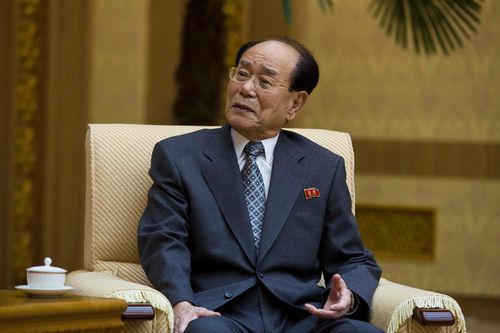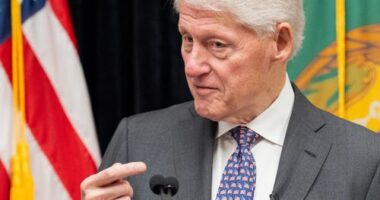Share this @internewscast.com
The Korean Central News Agency announced on Tuesday the death of Kim Yong Nam, the former president of North Korea’s Supreme People’s Assembly Presidium. He passed away on Monday at the age of 97, succumbing to multiple organ failure.
Following the announcement, North Korean leader Kim Jong Un paid his respects by visiting Kim Yong Nam’s bier on Tuesday, extending heartfelt condolences over the loss.

Kim Yong Nam’s prominence in North Korea’s diplomatic sphere was most notable during the periods of heightened engagement, such as the summits between Kim Jong Un and former U.S. President Donald Trump in 2018 and 2019. However, due to his advanced age, Kim Yong Nam’s participation in these events was limited, and his influence had begun to decline.
In April 2019, he was succeeded by Choe Ryong Hae, a trusted ally of Kim Jong Un, who previously held the position of top political officer in North Korea’s 1.2 million-strong military.
Kim Yong Nam’s career was a testament to his survival skills and adaptability within the North Korean political landscape.
His journey began when he joined the ruling Workers’ Party shortly after the conclusion of the Korean War in 1953, managing to navigate and endure various political purges throughout the 1970s.
He was appointed to the powerful Politburo in 1978 and served 15 years as foreign minister, starting in 1983.
During his tenure, the Berlin Wall fell and the Soviet Union disintegrated, leaving North Korea isolated.
North Korea watchers also say Kim Yong Nam had an expertise in third-world diplomacy.
He was a frequent participant in gatherings of nations that consider themselves independent from major power blocs, including the 2012 Non-Aligned Movement summit in Iran.
People who met Kim Yong Nam described him as mild-mannered but staunch in his opinions.
“I found Kim Yong Nam a puzzling figure. In greetings before business began, he was cordial and relaxed, but once at work, he relentlessly followed his script in a way that reminded of former Soviet foreign minister Andrei Gromyko,” former Washington Post reporter Don Oberdofer wrote in his book, “The Two Koreas.”
In a testament to his loyalty to the ruling dynasty, Kim Yong Nam read an elegy to Kim Il Sung when he died in 1994.
Kim Yong Nam also undertook the job of formally nominating Kim Jong Il to be chairman of the National Defense Commission after the son observed a three-year mourning period.
A native of Pyongyang, Kim Yong Nam studied at Kim Il Sung University and Moscow State University.












